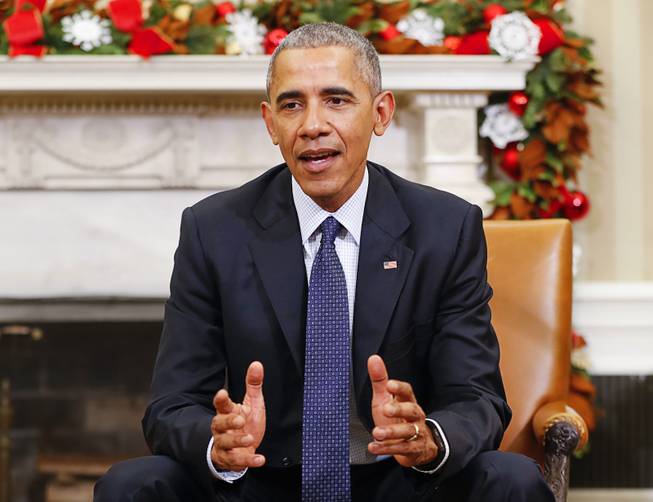
Pablo Martinez Monsivais / AP
In this Nov. 30, 2016, photo, President Barack Obama speaks in the Oval Office of the White House in Washington. Citing fears of a Donald Trump presidency, environmental groups are urging Obama to stay busy in his final weeks. He is listening.
Thursday, Dec. 1, 2016 | 1:02 a.m.
WASHINGTON — Citing fears of a Donald Trump presidency, environmental groups are urging President Barack Obama to stay busy in his final weeks.
He is listening.
With his days in office numbered, Obama has pushed ahead with several executive actions aimed at protecting the nation's land, air and water, even as he acknowledges his successor may try to undo the work before the ink is dry. The president has been cheered on by environmental groups and advocates braced for a new uphill fight in the next administration, and criticized by those who say an outgoing president shouldn't use his final days to stop what they say is the responsible development of the country's natural resources.
In the three weeks since Trump's election, the Obama administration has moved to block for several years new oil and gas drilling in the Arctic Ocean, canceled 25 oil and gas leases in western Colorado and halted new mining claims on 30,000 acres near Yellowstone National Park.
In a bid to curb methane emissions, the administration finalized regulations clamping down on oil companies that burn off natural gas on public lands. Meanwhile, the Corps of Engineers has delayed a decision on an oil pipeline to cross under a reservoir in North Dakota, saying it wants more study and tribal input.
The president also is considering designating more national monuments. In recent months, the administration has dispatched various high-ranking officials to California, Utah and Oregon specifically to gain public feedback.
Obama notes that several of his administration's actions have long been in the works — subject to public comment and notice — and are not a reaction to Trump's victory.
"These aren't things that we've been surprising people with. They're well-considered. They're the right thing to do. They're part of my task of finishing my work," the president said at a recent news conference.
Obama acknowledged that when the new president and Congress take charge, they will have the option of trying to undo some of the rules and regulations.
"That's part of how democracy works," he said. "But I feel very strongly these are the right things to do, and I'm going to make sure I do them."
Still, critics have complained the president has gone too far.
"The avalanche of regulations currently facing the oil and natural gas industry is an assault to America's energy future and to consumers and businesses," said Brooke Sammon, a spokeswoman for the American Petroleum Institute.
During the campaign, Trump vowed to undo many of Obama's environmental policies. In a broad outline of his immediate agenda, Trump said he would cancel "job-killing restrictions on the production of American energy, including shale energy and clean coal, creating many millions of high-paying jobs."
Trump's plans have environmental groups encouraging Obama to go out swinging for the fences. The Sierra Club, for example, is encouraging supporters to sign a petition urging Obama to approve three new national monuments that have generated much tension in the states involved. The proposals are: Bears Ears National Monument in Utah, Grand Canyon National Heritage Monument in Arizona and Gold Butte National Monument in Nevada. The Sierra Club is also calling on Obama to permanently ban drilling for oil and gas in the Arctic.
"It's critical for our future that you do everything you can to preserve your environmental legacy before leaving office. Please waste no time," the group's petition to Obama reads.
Athan Manuel, director of the lands protection program for the Sierra Club, said Obama has an "incredible environmental legacy" already, but the work the group is asking him to undertake in his final weeks in office would make it that much stronger and would be difficult for a Trump administration to reverse. He said that undoing a national monument or a drilling ban in the Arctic would likely require congressional action. Even with the GOP in charge of both chambers, it would be difficult for Republicans to find the votes to overcome procedural hurdles in the Senate.
"We're confident we can defend those on the Hill and keep those areas protected," Manuel said.
Other elements are more vulnerable.
Industry groups have already filed suit to block Obama's regulations designed to reduce methane emissions, and other major regulations are currently tied up in court.
Internal transition team documents show a Trump administration plans to abandon the legal defense of an EPA regulation designed to rein in carbon pollution from power plants and a recent EPA rule redefining "waters of the United States" protected under the Clean Water Act to include smaller creeks and wetlands.
Lawmakers could also use the Congressional Review Act to overturn regulations, a rarely used process that requires approving a joint resolution of disapproval and the president's signature.
Stuart Shapiro, director of the Public Policy Program at Rutgers University, said the Congressional Review Act is most effective when there is a change in the party controlling the White House, and that party also controls both chambers of Congress. Republicans will have to act quickly, within 60 legislative days, and will have many competing demands on their agenda.
Lawmakers have successfully used the act only one other time to quash a new regulation.
"We will add to that total of one," Shapiro said. "By how much, it's unclear."

Join the Discussion:
Check this out for a full explanation of our conversion to the LiveFyre commenting system and instructions on how to sign up for an account.
Full comments policy